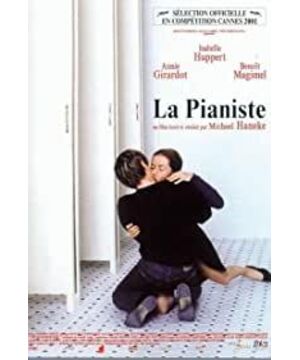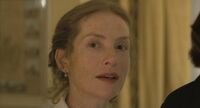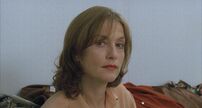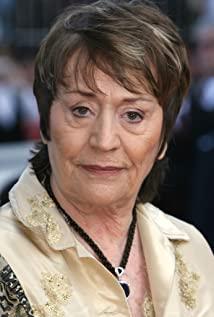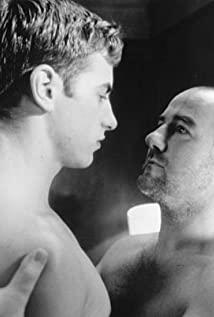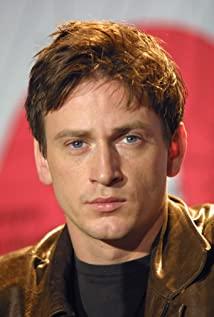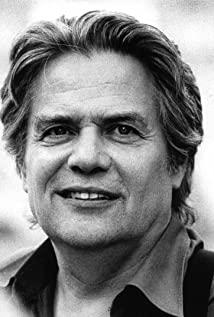Love is the existence of self-contradictory natures in real society. The film selected this time is "Piano Teacher", which is adapted from the novel of the same name by Elfrid Jelinek (1943~), directed by Michael Haneke and Nobel Prize winner for literature. I will understand it from the following three aspects, namely the literary expression of the novel, the visual representation of the characters in the film, and the flexible selection of the same theme by using different media. "Piano Teacher" is like Jelinek's semi-autobiographical novel, there are many expressions of personal emotions, so when reading the whole literary work, the thought is coherent but ethereal. The protagonist Eric is described by the author as a little girl who grew up under the strong control of her mother and grandmother. She can't choose the clothes she likes at random, and she can't easily contact the opposite sex, because in the eyes of her mother, this is her energy scattered to satisfy her meaningless vanity. So her upbringing was so patterned that at 36, her mother often referred to her as "child". Because of this strong oppression and stability, Eric has a strong desire to resist and conquer. She was always pretentious and arrogant. And the male protagonist, Kramer, is a master of love, and his teasing of Eric is to satisfy the male lustful conquest. Therefore, the author's expression of love's almost stream of consciousness reflects the contradiction and entanglement of love in conquest and obedience. Both men and women are condescending with their own sense of superiority and are unwilling to make any sacrifices. Eric is a family mirror and personal identity to the student Kramer's superiority, and Kramer's disparity between a hunter and a lamb has also produced incomparable pride. They may love each other, but neither is willing to give, resulting in conflicting struggles. From the point of view of film, I personally think that this is a film exclusively made by Director Haneke. Only he can express the coldness and richness of "Piano Teacher" so accurately and profoundly. Haneke is like a musician, he always manages the music subtly to participate in the narrative of the film. (Documentary "Director Haneke's Secret", 2013) The director himself also said that "music is the most efficient way of communication other than sexual behavior." It is precisely because of the director's understanding and use of music that more conscious, vague Emotions are expressed concretely. Eric became a highly skilled piano professor, her rebellion and her own nihilism manifested through the sonatas of Schubert and Beethoven. On the other hand, the director also used the opposite camera to express the inner and emotional changes of the characters. For example, in this scene of Eric and Claymore in the toilet, at first the front and back shots of the two were independent, and the women were in a higher perspective, and the larger the of view. But when the deep emotions and desires of the two people are stimulated and a compromise expectation is reached, the characters begin to be in the same frame and begin to share the same space and expression of meaning. (Dai Jinhua, "Film Criticism") The director himself also mentioned making the close-up of the face a personification of the stage set, making it flesh and blood. (Documentary "Director Haneke's Secret", 2013) After reading the novel and the film, you can clearly feel that the two have different emotional meanings for the choice of love. The novel emphasizes the repression of power, the resistance to women, the inherent independence between complex contradictions and the pain of longing for consensus. And the film Haneke wants to express a kind of existential nihility more. Not only does one body understand another, but one signal becomes the means by which another signal becomes a feature of another being one wishes to enter painfully. The deeper one goes in, the more the tissue decays. Once the flesh tissue becomes lighter, it will fly away from these two strange and hostile continents. (Elfrid Jelinek, "Piano Teacher") In order to fight against this nihilism, the pain of the flesh brings physical satisfaction, which becomes Eric's outlet. In the film, Eric always carries a small blade in her bag, and she cuts herself with a blade in the toilet by herself, trying to indulge in the pain of her body to drive away the nothingness of reality. (Zhang Lixin, "Twin Flowers", lecture) This is why the director uses many extreme expressive hands to make the audience feel the real pain. Finally, how to use the language expression suitable for the medium itself is also a place worth thinking about in the work of art itself. continents. (Elfrid Jelinek, "Piano Teacher") In order to fight against this nihilism, the pain of the flesh brings physical satisfaction, which becomes Eric's outlet. In the film, Eric always carries a small blade in her bag, and she cuts herself with a blade in the toilet by herself, trying to indulge in the pain of her body to drive away the nothingness of reality. (Zhang Lixin, "Twin Flowers", lecture) This is why the director uses many extreme expressive hands to make the audience feel the real pain. Finally, how to use the language expression suitable for the medium itself is also a place worth thinking about in the work of art itself. continents. (Elfrid Jelinek, "Piano Teacher") In order to fight against this nihilism, the pain of the flesh brings physical satisfaction, which becomes Eric's outlet. In the film, Eric always carries a small blade in her bag, and she cuts herself with a blade in the toilet by herself, trying to indulge in the pain of her body to drive away the nothingness of reality. (Zhang Lixin, "Twin Flowers", lecture) This is why the director uses many extreme expressive hands to make the audience feel the real pain. Finally, how to use the language expression suitable for the medium itself is also a place worth thinking about in the work of art itself.
View more about The Piano Teacher reviews


